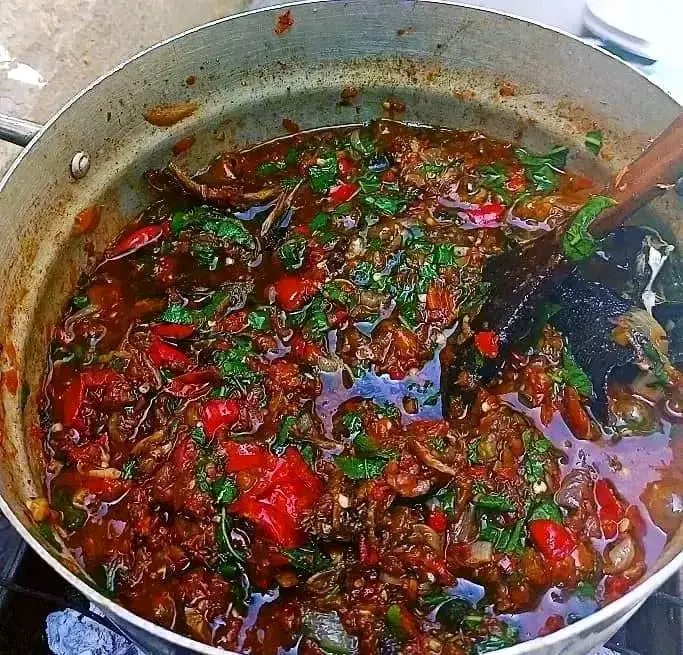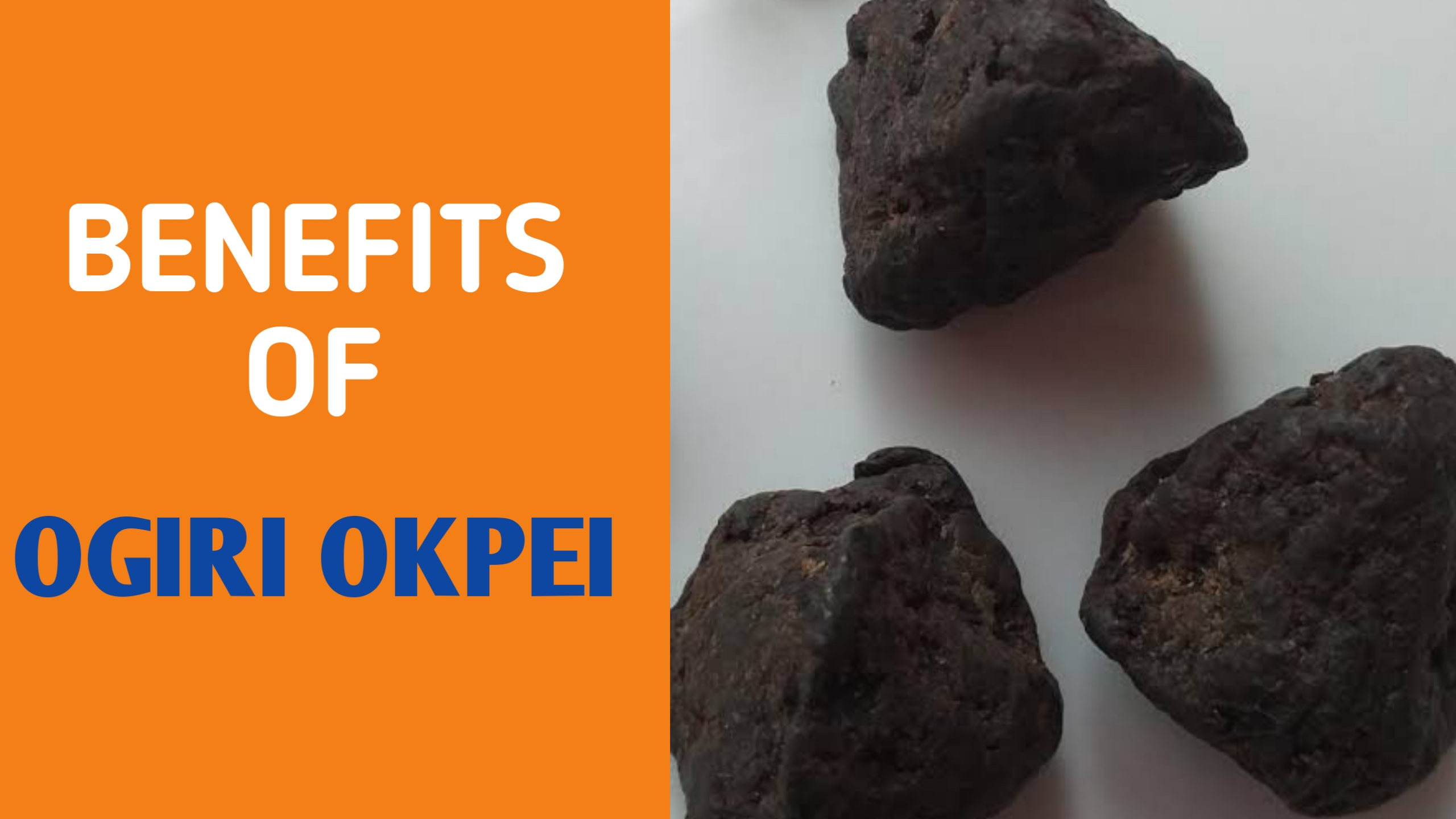Ogiri Okpei, also known as Nigerian fermented seasoning, is a traditional Nigerian condiment that adds a unique flavour to dishes. Made from fermented locust beans, it has a rich history and is widely used in Nigerian cuisine.
This article will explore the history of Ogiri Okpei, its health benefits, and its uses in cooking, and provide a step-by-step guide on how to make it at home.
Whether you’re a fan of Nigerian cuisine or simply curious about different condiments, this article will provide you with all the information you need to know about Ogiri Okpei.
So, let’s dive into the fascinating world of this flavorful ingredient and discover how it can elevate your cooking to new heights.
History of Ogiri Okpei
The history of Ogiri Okpei dates back centuries in Nigerian cuisine. This traditional fermented seasoning has been a staple in Nigerian households for generations.
The origins of the locust bean can be traced to the Igbo people of Nigeria, who have been using it as a flavour enhancer in their dishes for centuries.
The process of making it involves fermenting locust beans, which are native to West Africa. The beans are boiled, mashed, and left to ferment for several days. During the fermentation process, the beans develop a distinct aroma and flavour that adds depth to dishes.
How Yoga for Mental Health Can Improve Your Well-being
Ogiri Okpei has not only been used as a seasoning but also as a symbol of cultural identity. It is often associated with traditional Nigerian dishes such as soups, stews, and sauces.
The unique taste of Ogiri Okpei has made it a beloved ingredient in Nigerian cuisine, and it continues to be passed down through generations.
Today, it is not only popular in Nigeria but also gaining recognition in other parts of the world. It is being used by chefs and home cooks alike to add an authentic Nigerian flavour to their dishes.
With its rich history and unique taste, it is a true culinary treasure that showcases the diversity and richness of Nigerian cuisine.
Ogiri Okpei Health Benefits
Ogiri Okpei, the traditional Nigerian condiment, not only adds a unique flavour to dishes but also offers several health benefits.

One of the notable health benefits of Ogiri Okpei is its high nutritional value. It is made from fermented locust beans, which are rich in essential nutrients such as protein, fibre, vitamins, and minerals. These nutrients are important for maintaining overall health and well-being.
The fermentation process of Ogiri Okpei also enhances its probiotic properties. Probiotics are beneficial bacteria that promote a healthy gut microbiome. Consuming foods rich in probiotics, like Ogiri Okpei, can help improve digestion, boost the immune system, and support overall gut health.
Another health benefit of Ogiri Okpei is its potential anti-inflammatory properties. Locust beans contain compounds that have been found to possess anti-inflammatory effects.
Inflammation is a natural response of the body to injury or infection, but chronic inflammation can contribute to various health issues. Including Ogiri Okpei in your diet may help reduce inflammation and promote better overall health.
It is also known for its antioxidant properties. Antioxidants help protect the body against oxidative stress, which can lead to cell damage and various diseases. The fermentation process of Ogiri Okpei enhances its antioxidant content, making it a valuable addition to a healthy diet.
Furthermore, it is a natural flavour enhancer that can help reduce the need for excessive salt or artificial flavourings in dishes.
By using it in cooking, you can add depth and complexity to your meals while reducing sodium intake. This can be particularly beneficial for individuals with high blood pressure or those looking to maintain a balanced diet.
In summary, Ogiri Okpei offers several health benefits due to its nutritional value, probiotic properties, anti-inflammatory effects, antioxidant content, and ability to enhance flavours naturally.
Including this traditional Nigerian condiment in your diet can not only elevate the taste of your dishes but also contribute to your overall health and well-being.
Usefulness in Cooking
Ogiri Okpei, the traditional Nigerian condiment, is not only known for its unique flavour but also for its versatility in cooking.

One of the primary uses of Ogiri Okpei is in soups and stews. Adding a small amount of it to your favourite soup or stew can elevate the flavours and give them a distinct taste. Whether it’s a rich tomato-based soup or a hearty vegetable stew, it adds depth and complexity to the dish.
Ogiri Okpei can also be used as a seasoning for rice and beans. By incorporating a spoonful of it into the cooking process, you can infuse the dish with a savoury umami flavour. This works particularly well in dishes like jollof rice or Nigerian-style beans, where the flavours are bold and robust.
Furthermore, it can be used as a marinade for meats and seafood. The fermented condiment helps to tenderize the protein while imparting a unique taste. Whether you’re grilling chicken, frying fish, or roasting beef, marinating them with Ogiri Okpei can take your dishes to the next level.
In addition to savoury dishes, it can also be used in certain traditional Nigerian snacks and appetizers. For example, it can be added to akara (bean fritters) or moi moi (steamed bean pudding) to enhance their flavour and aroma.
Overall, Ogiri Okpei is a versatile ingredient that can be used in a wide range of dishes. Its unique taste and aroma make it a favourite among Nigerian cooks, adding an authentic touch to traditional recipes. Incorporating Ogiri Okpei into your cooking repertoire allows you to explore the rich flavours of Nigerian cuisine.
How to Make Ogiri Okpei
To make Ogiri Okpei, you will need a few key ingredients and some patience. The process of making this traditional Nigerian condiment involves fermented locust beans with other ingredients to create a rich and flavorful seasoning.
First, gather the necessary ingredients, including locust beans, potash (food tenderizer), and salt. Locust beans can be found in African grocery stores or online.
Start by washing the locust beans thoroughly to remove any dirt or debris. Then, soak the beans in water for a few hours to soften them.
Next, pound the beans using a mortar and pestle until they form a smooth paste. This step helps to break down the beans and release their flavour.
After pounding the beans, dissolve the potash in water and strain the liquid into the bean paste. The potash acts as a food tenderizer and helps with the fermentation process.
Add salt to the mixture and mix well. The salt helps to preserve the Ogiri Okpei and adds flavour.
Transfer the mixture to a clean container and cover it tightly. Allow the mixture to ferment for at least three days, but preferably up to a week. During this time, the flavours will develop and intensify.
Once the fermentation process is complete, your homemade Ogiri Okpei is ready to use in your favourite dishes. Store it in the refrigerator to prolong its shelf life.
Making Ogiri Okpei at home allows you to customize the flavours and ensure the quality of the ingredients. With a little time and effort, you can enjoy the authentic taste of this traditional Nigerian condiment in your kitchen.
Summary
Ogiri Okpei has a long history in Nigerian cuisine. It is believed to have originated from the Igbo tribe in Nigeria and has been used for centuries as a flavour enhancer in various dishes.
The process of fermenting locust beans to create Ogiri Okpei was developed as a way to preserve the beans and enhance their taste.
Over time, different regions in Nigeria have developed their variations of Ogiri Okpei, using different ingredients and fermentation methods.
Today, it is widely used in Nigerian cooking and is considered a staple in many traditional dishes.”
